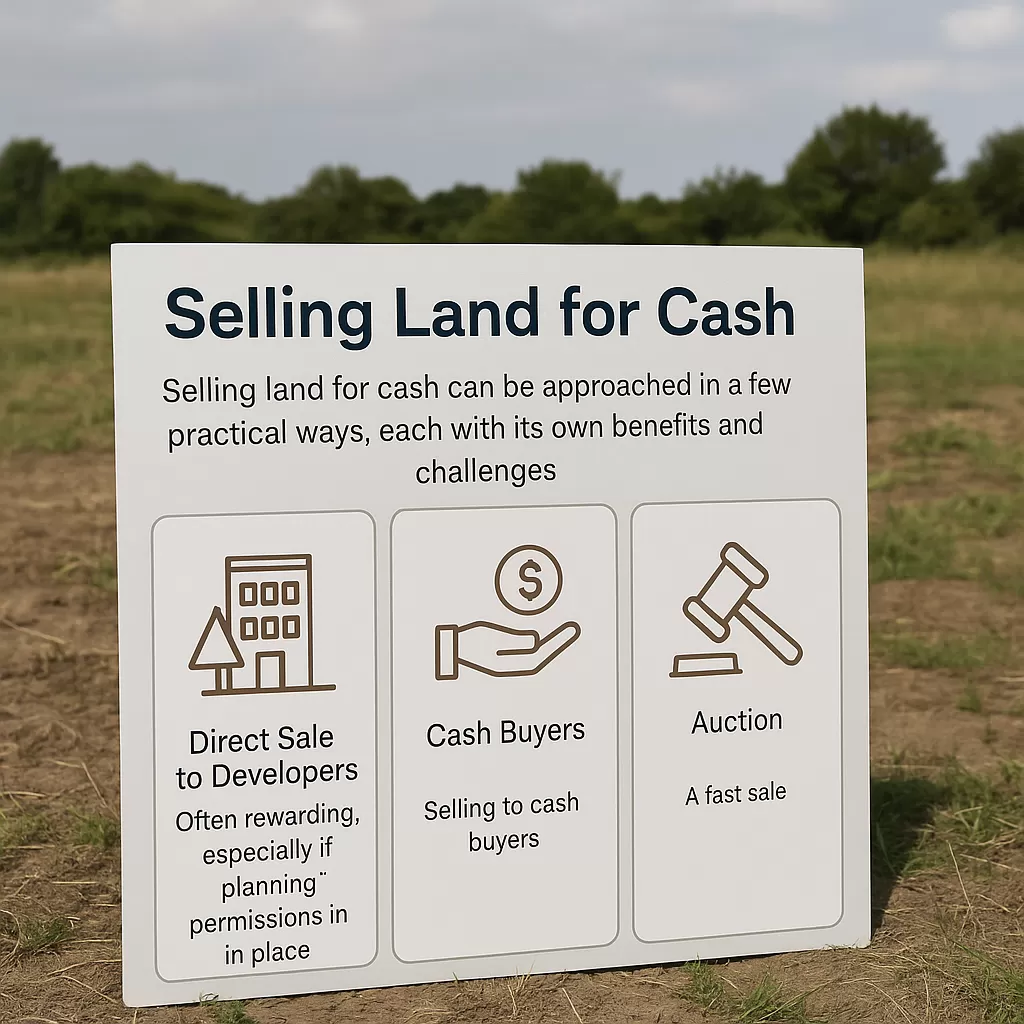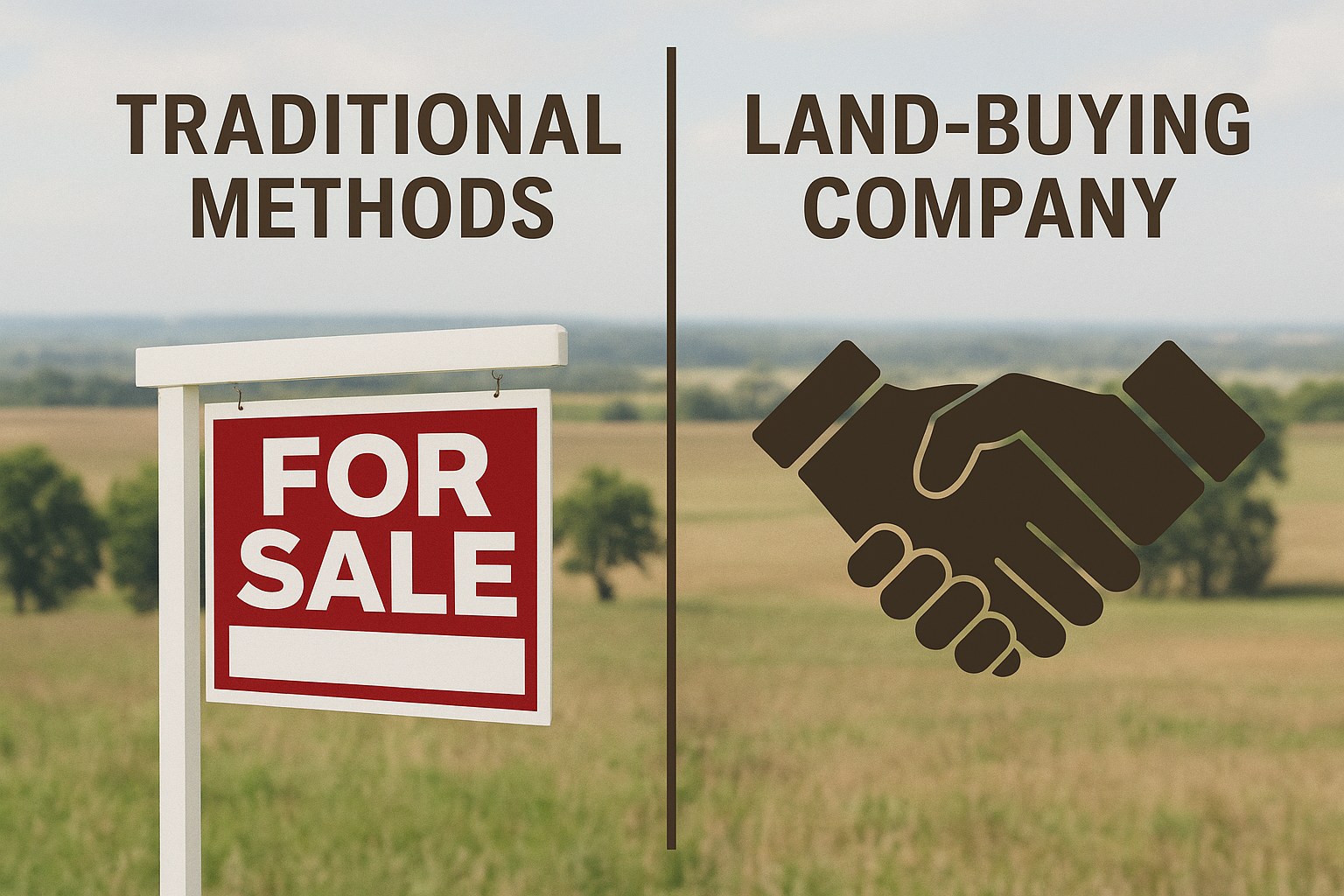Selling land can seem daunting, especially when compared to selling a house. Unlike residential properties, land lacks a ready-made visual appeal and requires potential buyers to imagine future possibilities. However, knowing how to sell land quickly and effectively can transform a challenging task into a smooth, profitable process. Whether you own a small plot for self-builders, a large agricultural field, or land with development potential, this in-depth guide provides practical strategies for a swift and successful sale.
Understanding the Land Market: Why Speed Matters
Before diving into tactics, it’s vital to understand what makes the land market unique. Unlike homes, land appeals to a diverse range of buyers — each with different motivations and timelines. Identifying these audiences is the first step to selling land quickly and effectively.
Who buys land?
- Property developers: Looking for large plots to build housing estates, commercial spaces, or mixed-use developments.
- Self-builders: Individuals dreaming of building a bespoke home.
- Investors: Seeking to hold land for long-term capital appreciation.
- Farmers and agricultural businesses: Acquiring additional farmland or expanding operations.
- Neighboring landowners: Wanting to increase the size of their existing property.
- Conservation groups and nature enthusiasts: Preserving green spaces or rewilding land.
- Recreational buyers: Using land for leisure activities like horse riding, fishing, or off-grid retreats.
Each of these buyer types has different priorities. Tailoring your approach to these groups is crucial if you want to sell land fast and at a fair price.
Market influences on land sales
Key factors that affect how quickly land sells include:
- Location and accessibility: Proximity to towns, transport links, and services.
- Planning permission status: Land with planning approval generally sells faster.
- Topography and usability: Flat, clear land is easier and more appealing to develop.
- Utility availability: Access to water, electricity, and sewerage enhances value.
- Local demand trends: Economic and housing market conditions strongly influence buyer interest.
Understanding these dynamics sets the stage for adequate preparation and marketing.
Preparing Your Land: Laying the Groundwork for a Quick Sale
A well-prepared plot is far more attractive to buyers and can significantly shorten the selling timeline.
Key preparation steps
- Obtain a boundary survey: Accurate, professional surveys reassure buyers and avoid disputes.
- Clarify planning potential: Secure outline or full planning permission. Even pre-application advice from the local council can demonstrate potential.
- Compile documentation: Title deeds, access rights, utility availability, and environmental assessments should be readily available.
- Improve access: Ensuring clear, legal, and practical access to the plot is critical.
- Tidy and clear the land: Remove debris, mark boundaries clearly, and consider minor landscaping to showcase usability.
- Assess and mitigate environmental issues: Identify flood risks, contamination, or protected wildlife areas early.
Adding value to encourage quick offers
- Utility connections: Where feasible, arrange for water or electricity connections or obtain quotes.
- Create conceptual plans: Visual or site layout ideas can help buyers envision potential projects.
- Divide large plots: Subdividing into smaller parcels can attract more buyers with varied budgets.
The more effort you put into preparation, the more confidence buyers will have to proceed quickly.
 Sell your land quickly with proven methods and tips.
Sell your land quickly with proven methods and tips.
Setting the Right Price: The Fast-Track to Buyer Interest
Getting the price right from the start is crucial if you want to avoid long periods on the market.
How to determine a realistic price
- Professional valuation: Engage a specialist land valuer with local expertise.
- Market comparisons: Review recent land sales in your area with similar attributes.
- Development value calculation: Factor in potential uplift from future development, where relevant.
- Price per acre benchmarks: Useful for larger plots, mainly agricultural or rural land.
Overpricing is one of the main reasons land stays unsold for extended periods. A fair, well-researched price invites more viewings and offers, ultimately reducing time to sale.
Marketing Strategies: Attracting the Right Buyers Quickly
Once your land is ready and priced correctly, a targeted marketing strategy will connect you with the right audience.
Digital marketing essentials
- Specialist land listing sites: Platforms focused on land sales reach serious buyers.
- Major property portals: Sites like Rightmove and Zoopla offer dedicated land sections.
- High-quality drone footage: Aerial videos effectively showcase plot size, access, and surroundings.
- Interactive maps and 3D plans: Help buyers visualize boundaries and topography.
- Social media campaigns: Facebook, Instagram, and LinkedIn ads can reach investors, developers, and niche groups.
- Email outreach: Sending targeted mailshots to developers, architects, and local investors.
Traditional methods that still work
- On-site signage: A prominent “Land for Sale” sign can catch passing interest.
- Local press adverts: Especially effective in rural areas or tight-knit communities.
- Networking with local professionals: Estate agents, solicitors, and surveyors often know potential buyers.
- Community boards and events: Posting in village halls, farm shops, and local gatherings can uncover buyers who aren’t actively searching online.
Combining digital and traditional tactics provides the widest exposure, maximizing your chances of a quick sale.
Speeding Up the Sale: Accelerated Methods
In certain situations, prioritizing speed over price maximization is the best choice.
Selling at auction
Auctions provide a guaranteed sale date and create a sense of urgency among buyers. Benefits include:
- Fixed timeline and quick completion (usually within 28 days).
- Competitive bidding can sometimes achieve higher prices.
- Buyers are legally committed once the hammer falls.
Price reduction strategies
- Incremental reductions: Gradual price drops if initial interest is low.
- Publicizing price changes: Updating online listings and contacting interested parties to renew attention.
Offering incentives
- Covering planning application fees or survey costs.
- Offering flexible payment terms or deferred completions.
- Including additional assets (e.g., equipment or rights) to sweeten the deal.
Direct sale to land-buying companies
Specialist land-buying firms purchase land quickly for cash, often completing within 2–4 weeks. This approach offers:
- Immediate offers with minimal paperwork.
- Sales without needing to prepare or improve the land.
- Certainty and simplicity are ideal if dealing with inherited land, financial urgency, or stalled marketing.
Overcoming Common Sale Obstacles
Land sales can face unique hurdles. Addressing these early ensures a smooth, rapid transaction.
Planning and zoning challenges
- Clarify existing designations and future potential.
- Engage with planning consultants to pre-empt buyer concerns.
- Highlight similar successful nearby developments as proof of feasibility.
Access and easement complications
- Confirm legal rights of access and clarify shared maintenance agreements.
- Consider upgrading access routes before marketing.
Environmental and legal concerns
- Complete contamination surveys and environmental checks.
- Obtain flood risk assessments and protected species reports where needed.
- Address title irregularities or restrictive covenants proactively.
Transparent documentation and upfront disclosure build trust and remove obstacles that delay sales.
Working with Professionals: Your Allies for a Fast Sale
Choosing the right experts can distinguish between a quick, smooth sale and a drawn-out, stressful experience.
Specialist land agents
- Provide realistic valuations and local market insight.
- Maintain networks with developers and institutional buyers.
- Offer tailored marketing packages to reach the right audiences.
Solicitors experienced in land transactions
- Streamline title checks and resolve legal complexities promptly.
- Organize all required documentation in advance to avoid delays.
Surveyors and consultants
- Verify boundaries and provide topographical and environmental reports.
- Advise on planning opportunities and feasibility.
Tax advisors
- Help plan for capital gains and other tax implications to avoid unexpected liabilities.
A strong professional team enables you to act decisively and meet buyer expectations swiftly.
 Explore opportunities to sell your land today.
Explore opportunities to sell your land today.
The Direct Sale Alternative: Speed and Simplicity
When speed is the primary goal, selling directly to a land-buying company offers a simple and effective solution.
How it works
- Initial consultation to discuss objectives and gather information.
- Quick assessment and indicative offer within days.
- Streamlined due diligence with minimal documentation required.
- Cash offer with flexible completion timelines, usually within 2–4 weeks.
When is this approach ideal?
- Inherited or unwanted land requiring quick disposal.
- Financial pressures need fast capital release.
- Land with legal or planning complications.
- Properties that failed to sell via traditional marketing.
Though you might not achieve the absolute highest price, the speed and certainty often outweigh this for many sellers.
Conclusion
Learning how to sell land quickly and effectively involves preparation, accurate pricing, strategic marketing, and using the right professional support. By thoroughly understanding your land, preparing it for the market, and choosing the most suitable sale method, you can achieve a smooth, rapid transaction that meets your financial and personal goals.
Working with direct land-buying companies such as The Property Buyers provides an efficient, no-hassle alternative for those prioritizing maximum simplicity and speed. Regardless of the strategy you select, being proactive and informed is key.
With the right strategy, you can navigate the complexities of the land market confidently and unlock the full value of your property — all while completing your sale far faster than you might expect.
Frequently Asked Questions
1. How long does selling land in the UK usually take?
The timeline for selling land can vary greatly depending on location, planning status, market demand, and access. On average, a traditional land sale can take several months to over a year. However, by using targeted marketing strategies and preparing your land thoroughly, it’s possible to sell much more quickly. If speed is your focus, selling directly to a specialist land-buying company can often result in completion within 2 to 4 weeks.
2. Do I need planning permission to sell my land?
You do not need planning permission to sell land, but having planning permission in place can significantly increase its value and attract more serious buyers. Many purchasers, especially developers and self-builders, prefer plots with approved planning as it reduces their risk and shortens their project timeline. Even outline permission can make your land more appealing.
3. How should I determine the right price for my land?
Pricing land correctly is crucial for a swift and successful sale. It’s advisable to seek a professional valuation from a land agent or chartered surveyor and to analyze recent sales of comparable plots in your area. Consider development potential, access, services, and local market trends. An overpriced plot can remain on the market for years, while an attractively priced one will generate faster interest and competition.
4. What documents must I prepare before listing my land for sale?
To facilitate a smooth transaction, you should gather complete documents before going to market. This includes a boundary survey, title deeds, topographical maps, access and easement information, planning history, utility details, and relevant environmental reports. Comprehensive, well-prepared documentation reassures buyers and helps avoid delays during due diligence.
5. Is selling land at auction a good option?
Auctions can be an excellent choice if you are looking for a fast and definite sale. They create a competitive environment that sometimes drives the price higher than expected. However, it’s essential to set a realistic reserve price and understand that you relinquish some control over the final sale price. Auctions are particularly effective for plots with strong demand or unique characteristics likely to attract multiple bidders.


 Sell your land quickly with proven methods and tips.
Sell your land quickly with proven methods and tips. Explore opportunities to sell your land today.
Explore opportunities to sell your land today.






